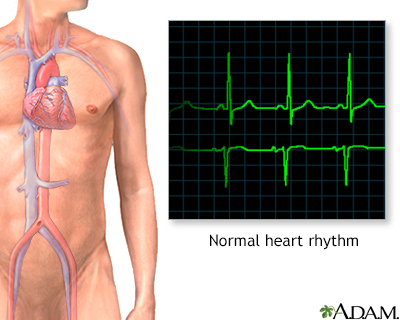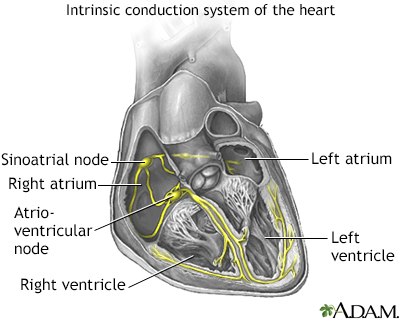Arrhythmias
Abnormal heart rhythms; Bradycardia; Tachycardia; Fibrillation
An arrhythmia is a disorder of the heart rate (pulse) or heart rhythm. The heart can beat too fast (tachycardia), too slow (bradycardia), or irregularly.
An arrhythmia can be harmless, a sign of other heart problems, or an immediate danger to your health.
Images







Animation

I Would Like to Learn About:
Causes
Normally, your heart works as a pump that brings blood to the lungs and the rest of the body.
To help this happen, your heart has an electrical system that makes sure it contracts (squeezes) in an orderly way.
- The electrical impulse that signals your heart to contract begins in an area of the heart called the sinoatrial node (also called the sinus node or SA node). This is your heart's natural pacemaker.
- The signal leaves the SA node and travels through the heart along a set electrical pathway.
- Different nerve messages signal your heart to beat slower or faster.
Arrhythmias are caused by problems with the heart's electrical conduction system.
- Abnormal extra signals may occur.
- Electrical signals may be blocked or slowed.
- Electrical signals travel in new or different pathways through the heart.
Some common causes of abnormal heartbeats are:
- Abnormal levels of potassium, magnesium, or other substances in the body
- Heart attack, or a damaged heart muscle from a past heart attack
- Heart disease that is present at birth (congenital)
- Heart failure or an enlarged heart
- Overactive thyroid gland
Arrhythmias may also be caused by some substances or drugs, including:
- Alcohol or stimulant drugs
- Certain medicines
- Cigarette smoking (nicotine)
Some of the more common abnormal heart rhythms are:
- Atrial fibrillation or flutter
- Atrioventricular nodal reentry tachycardia (AVNRT)
- Heart block or atrioventricular block
- Multifocal atrial tachycardia
- Paroxysmal supraventricular tachycardia
- Sick sinus syndrome
- Ventricular fibrillation or ventricular tachycardia
- Wolff-Parkinson-White syndrome
Symptoms
When you have an arrhythmia, your heartbeat may be:
- Too slow (bradycardia)
- Too quick (tachycardia)
- Irregular, uneven, possibly with extra or skipped beats
An arrhythmia may be present all of the time or it may come and go. You may or may not feel symptoms when the arrhythmia is present. Or, you may only notice symptoms when you are more active.
Symptoms can be very mild, or they may be severe or even life threatening.
Common symptoms that may occur when the arrhythmia is present could include:
- Chest pain
- Fainting
- Lightheadedness, dizziness
- Paleness
- Palpitations (feeling your heart beat fast or irregularly)
- Shortness of breath
- Sweating
Exams and Tests
The health care provider will listen to your heart with a stethoscope and feel your pulse. Your blood pressure may be low or normal or even high as a result of being uncomfortable.
An electrocardiogram (ECG) will be the first test done.
Heart monitoring devices are often used to identify the rhythm problem, such as a:
- Holter monitor (where you wear a device that records and stores your heart rhythm for 24 or more hours)
- Event monitor or loop recorder (worn for 2 weeks or longer, where you record your heart rhythm when you feel an abnormal rhythm)
- Other long-term monitoring options
An echocardiogram is sometimes ordered to examine the size or structure of your heart.
In selected cases, coronary angiography may be performed to see how blood flows through the arteries in your heart.
A special test, called an electrophysiology study (EPS), is sometimes done to take a closer look at the heart's electrical system.
Treatment
When an arrhythmia is serious, you may need urgent treatment to restore a normal rhythm. This may include:
- Electrical therapy (defibrillation or cardioversion)
- Implanting a short-term heart pacemaker
- Medicines given through a vein or by mouth
Sometimes, better treatment for your angina or heart failure will lower your chance of having an arrhythmia.
Medicines called anti-arrhythmic drugs may be used:
- To prevent an arrhythmia from happening again
- To keep your heart rate from becoming too fast or too slow
Some of these medicines can have side effects. Take them as prescribed by your provider. Do not stop taking the medicine or change the dose without first talking to your provider.
Other treatments to prevent or treat abnormal heart rhythms include:
- Cardiac ablation, used to target areas in your heart that may be causing your heart rhythm problems
- An implantable cardioverter defibrillator, placed in people who are at high risk of sudden cardiac death
- Permanent pacemaker, a device that senses when your heart is beating too slowly. It sends a signal to your heart that makes your heart beat at the correct pace.
Outlook (Prognosis)
The outcome depends on several factors:
- The kind of arrhythmia you have.
- Whether you have coronary artery disease, heart failure, or valvular heart disease.
When to Contact a Medical Professional
Contact your provider if:
- You develop any of the symptoms of a possible arrhythmia.
- You have been diagnosed with an arrhythmia and your symptoms worsen or do not improve with treatment.
Prevention
Taking steps to prevent coronary artery disease may reduce your chance of developing an arrhythmia.
Related Information
PulseAngina
Heart attack
Heart failure
Stroke
Atrial myxoma
Cardiac ablation procedures
Heart pacemaker
Atrial fibrillation - discharge
Taking warfarin (Coumadin, Jantoven) - what to ask your doctor
Heart pacemaker - discharge
References
Al-Khatib SM, Stevenson WG, Ackerman MJ, et al. 2017 AHA/ACC/HRS guideline for management of patients with ventricular arrhythmias and the prevention of sudden cardiac death: Executive summary: A Report of the American College of Cardiology/American Heart Association Task Force on Clinical Practice Guidelines and the Heart Rhythm Society. Heart Rhythm. 2018;15(10):e190-e252. PMID: 29097320 pubmed.ncbi.nlm.nih.gov/29097320/.
Nattel S, Tomaselli GF. Mechanisms of cardiac arrhythmias. In: Libby P, Bonow RO, Mann DL, Tomaselli GF, Bhatt DL, Solomon SD, eds. Braunwald's Heart Disease: A Textbook of Cardiovascular Medicine. 12th ed. Philadelphia, PA: Elsevier; 2022:chap 62.
Olgin JE. Approach to the patient with suspected arrhythmia. In: Goldman L, Cooney KA, eds. Goldman-Cecil Medicine. 27th ed. Philadelphia, PA: Elsevier; 2024:chap 49.
Tracy CM, Epstein AE, Darbar D, et al. 2012 ACCF/AHA/HRS focused update of the 2008 guidelines for device-based therapy of cardiac rhythm abnormalities: a report of the American College of Cardiology Foundation/American Heart Association Task Force on Practice Guidelines. J Am Coll Cardiol. 2012;60(14):1297-1313. PMID: 22975230 pubmed.ncbi.nlm.nih.gov/22975230/.
BACK TO TOPReview Date: 5/27/2024
Reviewed By: Michael A. Chen, MD, PhD, Associate Professor of Medicine, Division of Cardiology, Harborview Medical Center, University of Washington Medical School, Seattle, WA. Also reviewed by David C. Dugdale, MD, Medical Director, Brenda Conaway, Editorial Director, and the A.D.A.M. Editorial team.

Health Content Provider
06/01/2025
|
A.D.A.M., Inc. is accredited by URAC, for Health Content Provider (www.urac.org). URAC's accreditation program is an independent audit to verify that A.D.A.M. follows rigorous standards of quality and accountability. A.D.A.M. is among the first to achieve this important distinction for online health information and services. Learn more about A.D.A.M.'s editorial policy, editorial process and privacy policy. A.D.A.M. is also a founding member of Hi-Ethics. This site complied with the HONcode standard for trustworthy health information from 1995 to 2022, after which HON (Health On the Net, a not-for-profit organization that promoted transparent and reliable health information online) was discontinued. |
The information provided herein should not be used during any medical emergency or for the diagnosis or treatment of any medical condition. A licensed medical professional should be consulted for diagnosis and treatment of any and all medical conditions. Links to other sites are provided for information only -- they do not constitute endorsements of those other sites. © 1997- 2025 A.D.A.M., a business unit of Ebix, Inc. Any duplication or distribution of the information contained herein is strictly prohibited.
